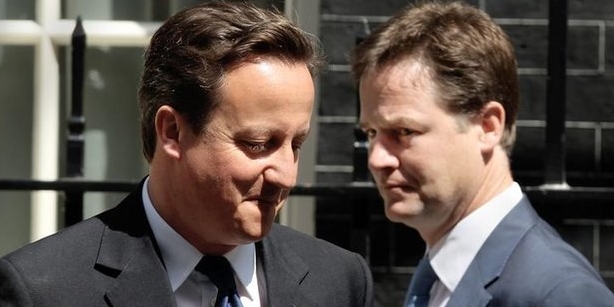Coalition politics remains relatively unfamiliar to British politicians, despite the experience of the past five years. Throughout the election campaign, the main party leaders have poured scorn on the idea of another coalition after May 7th, and have given the public little detail on their preferences for different potential coalition partners. In this post, Marie-Noelle Loewe points to evidence from across Europe that suggests there is little reason to expect future coalitions to lead to chaos, incoherence, or unpredictable decision making.
Given their relative historic rarity in the UK, it is perhaps not surprising that the outlook of another coalition Government appears to not sit well with the British public. Until May 2010, the closest thing to a coalition post-war Britain had experienced at national level was the Callaghan Lib/Lab pact. Following a bi-election defeat which had let to Labour losing its overall majority in March 1977, then Prime Minister James Callaghan agreed to a range of policies proposed by the Liberal Democrats in exchange for their support in a no confidence vote. Known as the Lib-Lab pact, this rather loose agreement lasted a mere 18 months, after which Labour ruled as minority government until the General Elections in May 1979.
Perhaps surprisingly, the current coalition government has lasted for an entire electoral term. However, the open lack of appreciation and seemingly ongoing campaigning against the coalition partner could explain why the coalition model does not seem to encourage confidence in voters.
Nevertheless, a mere week before the general elections, polls consistently indicate that no party is likely to win an overall majority. Each day, we get closer to another hung parliament and the ensuing bartering to form a government. Despite this, party leaders seem to be reluctant to even tentatively suggest which marriage of convenience they would prefer. Instead, polarising and sometimes confusing statements are made about the potential impact of coalitions. Leaders from all camps seem to suggest that a government model that is applied with relative success in much of continental Europe would lead to constitutional chaos, incoherent legislation and unpredictable decision making, all of which would throw the country into disarray. In fact, coalitions do no such thing, as a look to the continent demonstrates.
In post-war Germany, despite a period of instability in the 1960s which saw four chancellors in only a decade, coalition governments have long been the norm since the first Bundesregierung was elected in 1949. It was a coalition government of Helmut Kohl’s Christian Democratic Union and the German Liberal Democrats (FDP) that oversaw the country’s reunification in 1990, a coalition Government of Social Democrats (SPD) and the Green Party that laid the stonework for Germany’s current competitiveness through radical reform of the country’s Labour market laws, and a “grand coalition” of SPD and CDU that brought down unemployment in Germany to its lowest level in decades. Of course this does not mean that a coalition government is without its challenges, yet it seems that these are mainly caused by the perils of running a country, rather than through the agreement of sharing power with another party.
The Netherlands, known for their mainly inclusive and stable governments, also have a strong track record on coalitions. Since 1966, the Dutch have continuously elected relatively stable coalition governments in which either the main centre left or centre right parties were represented. In the 1980s, a coalition of the Dutch Conservative CDA and the Dutch Labour Party (PdVA) led on a comprehensive reform of the welfare system which resulted in a significant reduction of both the deficit and unemployment numbers. Interestingly, the least successful coalition the country experienced was in 2002, when the Conservative CDA and the conservative-liberal VDD entered into a coalition with the party of the populist, anti-immigrant leader Pim Fortuyn LPM, who had been assassinated only a week before the elections. The agreement proved to be short-lived and ended after only 87 days.
And Sweden, which has been governed by either Socialist-led minority or coalition governments since the 1970s, constantly tops international rankings with regards to its educational system and equality standards.
Another look to Germany also shows that pre-election repudiations of potential coalition partners should be taken with a healthy pinch of scepticism. Parties usually indicate who they would like to share governmental responsibility with, although the political realities after the election do not always allow them their first choice. Former SPD Chancellor Gerald Schroeder famously said in 2005 that the Social Democrat would never make Angela Merkel Chancellor, only to enter into coalition with her Christian Democratic Party and vacate his post to her several weeks later (after albeit difficult negotiations). With polls too close to call, Mr Miliband might find himself favouring a formal coalition with the SNP over a minority government. After all, the last minority government led by a Labour Prime Minister lasted only 8 months, after which James Callaghan had to leave No 10 for Margaret Thatcher and Labour did not return to power for 28 years.
Neither do coalitions mean that collating parties must necessarily agree on all issues they agree to tackle in their coalition agreement. One example recently cited as deal breaker between a potential SNP/Labour coalition is the extension of Trident. Although Labour and SNP have opposing views on the issue, a coalition agreement could allow a free vote. Labour could look to the Tories for support, given that questions of national security have seen these parties reaching cross-floor agreements in the past. Equally, while another Conservative/Lib Dem deal with potential UKIP involvement would almost certainly lead to a referendum on the UK’s membership of the European Union, these parties would equally certainly campaign for different outcomes.
Coalitions can have the benefit of bringing together the most talented political leaders and policy makers in a single Government. If the trend emerging in the polls is confirmed on 7th May, British politicians as well as the British public should embrace this new political reality as an opportunity rather than treating it as an undesired development. Perhaps they might even lead to a more mature political behaviour from actors in Westminster, though hope that the political culture in the Commons would benefit in the short term should be treated with caution. Ultimately, the success of coalition governments depend on the willingness of participating parties to constructively work together. Whoever is next to be given the keys to No 10 would do well to remember this.
Note: This article gives the views of the author, and not the position of the General Election blog, nor of the London School of Economics. Please read our comments policy before posting.
 Marie-Noelle Loewe holds a Master’s Degree in Sociology from the University of Muenster and an MA in Middle East Politics from Birbeck University. She works in Financial Regulation.
Marie-Noelle Loewe holds a Master’s Degree in Sociology from the University of Muenster and an MA in Middle East Politics from Birbeck University. She works in Financial Regulation.







